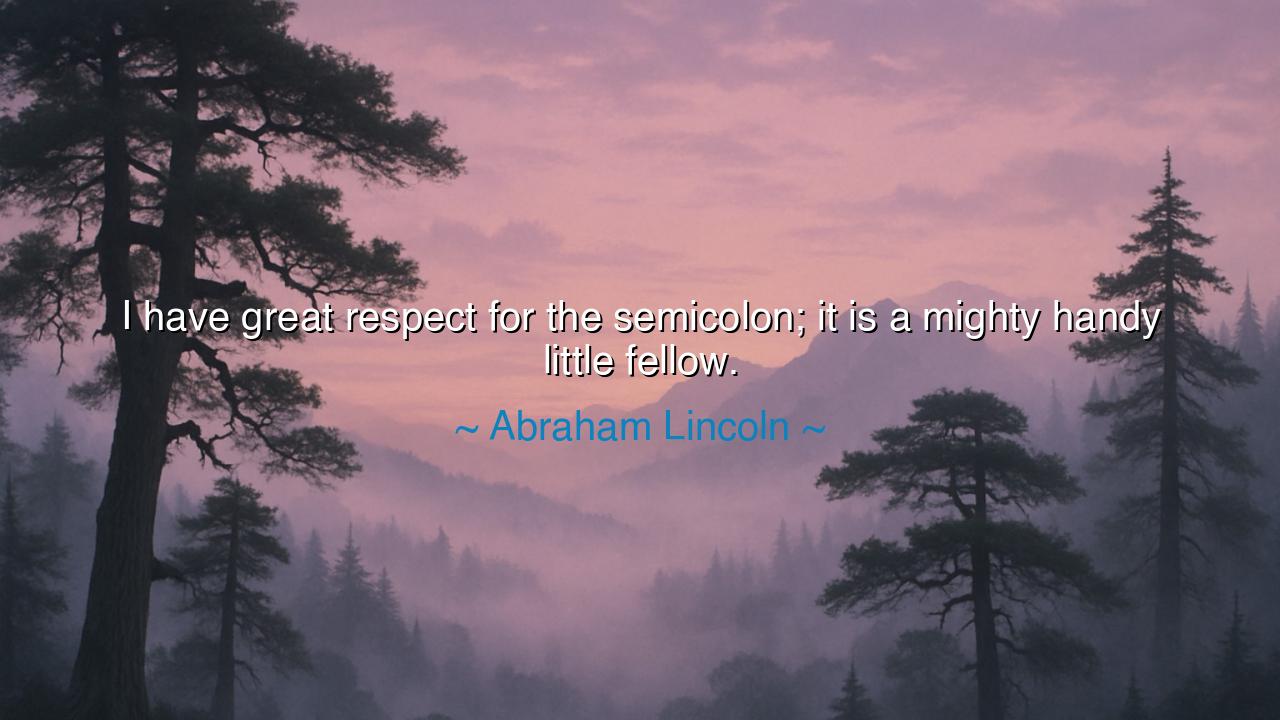
I have great respect for the semicolon; it is a mighty handy






In the words of Abraham Lincoln, "I have great respect for the semicolon; it is a mighty handy little fellow." At first glance, this may seem like a lighthearted comment on punctuation, yet embedded in this simple admiration lies a profound recognition of the power that small, seemingly inconspicuous things can hold. The semicolon, like a humble servant in the world of grammar, serves as a bridge between ideas, holding the weight of connections, pauses, and transitions that would otherwise be lost in the void. Lincoln’s appreciation for this modest mark of punctuation reveals a deeper truth about the importance of things that may seem small but play a crucial role in uniting greater concepts.
The ancients understood the significance of balance and connection. In the writings of Aristotle, we learn that the key to wisdom and clarity in communication lies in the ability to make connections between disparate ideas. Just as the semicolon brings together two related thoughts into one sentence, Aristotle taught that virtue lies in the ability to balance and connect opposing forces within the soul. The ancient philosophers were keenly aware that the smallest things—whether they were moments of insight or small acts of courage—could carry immense weight in the larger arc of life. Lincoln’s praise for the semicolon mirrors this ancient wisdom: that even the smallest tools, when used correctly, can bring clarity and meaning to our world.
Consider the ancient art of rhetoric, where orators like Cicero and Demosthenes understood that true persuasion came not just from powerful speech but from the careful balance of ideas. In their speeches, the arrangement of pauses, emphasis, and flow was as vital as the content itself. The semicolon plays a similar role in written language—it is not an interruption or a finality, like the period, but a pause that connects one thought to another, allowing for deeper understanding. Lincoln’s acknowledgment of its might reflects a fundamental truth: clarity and respect for the structure of communication can elevate even the simplest ideas to a level of profound insight.
Take, for example, the speeches of Winston Churchill during World War II. Churchill was known for his mastery of language, his ability to weave together powerful, moving statements that rallied a nation. In his speeches, much like in the careful placement of a semicolon, the pauses and pacing of his words were as significant as their meaning. His ability to pause at just the right moment, allowing the weight of his words to settle, created a rhythm of hope and determination that moved millions. Just as Lincoln found great respect for the semicolon, Churchill understood that the power of language, when carefully crafted, could shift the course of history.
Lincoln’s use of the semicolon as a metaphor for respect also reflects a larger theme in his leadership. As a leader during one of the most tumultuous times in American history, Lincoln knew that even small, seemingly insignificant acts—such as crafting the right word or phrase, or choosing the right moment to act—could have far-reaching consequences. The semicolon, like Lincoln’s steady hand, is not overt in its power, but its influence is undeniable. By connecting thoughts and ideas, it creates a seamless flow that brings together people, concepts, and, in the case of Lincoln’s leadership, a nation. In this way, Lincoln’s reverence for the semicolon is a recognition of the quiet but potent forces that shape our world.
The lesson here is clear: we must learn to value and respect the small things in life, for they often hold the most profound power. The semicolon teaches us the importance of balance and connection, of taking the time to pause, reflect, and bring disparate thoughts together. In our daily lives, this can mean taking the time to listen, to find harmony in conflict, and to understand the subtle connections that bind us to others. Just as Lincoln recognized the strength in a small punctuation mark, we must learn to recognize the power in small, thoughtful actions—the pauses we take in our speech, the patience we show in our relationships, and the humility we bring to our work.
Let us take this lesson from Lincoln and the semicolon: the smallest tools, the quietest acts, and the most humble pauses often carry the greatest impact. Let us approach our lives with the respect and care that Lincoln showed for this simple mark of punctuation, understanding that in the rhythm of our lives, it is the balance, the thoughtful connection, and the respectful pause that allow us to communicate more clearly and act more wisely. In doing so, we find strength in even the smallest of things, for in them lies the power to shape our world.






AAdministratorAdministrator
Welcome, honored guests. Please leave a comment, we will respond soon